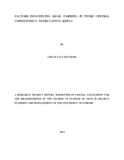| dc.description.abstract | Protein deficiency has remained a major challenge in the world. In Kenya, the recommended
animal protein requirements by the Food and Agriculture Organization have not been met for
most citizens. Quail farming is a cheap source of animal protein. Despite the introduction of the
quail farming to cross the nutrition gap, the number of households keeping quails in Nyeri
Central Constituency still remains low. Quail farming is faced by challenges such as overall
sector disorganization, a weak feed industry, lack of ready market access and information for
smallholder producers, lack of access to inputs and stock procurement and prevalence of avian
diseases among other challenges. Therefore, the research sought to find out the factors
influencing quail farming in the area of study. The objective of the study was to find out the
influence of social factors, management practices, perceived nutritional and medicinal value and
access to market on quail farming. Descriptive survey was used to gather information from a
target population of the 300 quail farmers in Nyeri Central Constituency, four livestock
government officers and one feed supplier. A sample of 169 quail farmers was selected from the
five wards through stratified random sampling in order to ensure that they are evenly spread
within the 5 wards. From each ward, snow ball sampling technique was used until the defined
sample size was reached. A ward different from the study population was used for pilot testing.
Questions were asked as research tool for data collection from quail farmers and interview
schedules were used to collect data from the Government Officers and input supplier. The raw
data was organized systematically, coded and analyzed through descriptive statistics with aid of
computer software Statistical Package for the Social Sciences. The data was then presented using
percentages and tables. The findings of the study revealed that 57.9 % of quail farmers were
males who were middle aged, well educated and had practiced quail farming for less than 12
months. This affects quail farming because it is usually a women domain. Majority (97%) of
quail farmers used chicken feed and 62.8% of the farmers did not use feed supplements. Most
(89.6%) of the quail farmers kept quails for income generation rather than for their nutritive or
medicinal value and 77.4% of the quail farmers did not eat quails eggs. According to the study,
66.5% of the quail farmers cited unreliable market as the major market challenge followed by
lack of market information with 58.5%. Majority (95.1%) of quail farmers had no organizations
to assist in marketing of their quails. It was concluded that in order to promote the development
of quail farming, there is a need to factor in the special needs of women when government
policies on social activities are being crafted in order to realize the full potential of women
contribution in the quail farming. Secondly, unavailability of quail feeds slows down production
and productivity of quails and so there is a need to have feeds specifically formulated for quails.
Despite the quail farmers being aware of the nutritive and medicinal value of quails eggs, there is
low consumption of quail eggs due to traditional belief that quails are pets for children and only
children especially boys should eat them and in order to enhance local consumption of quails
eggs, information on nutritive and medicinal values of quails should be provided in order to
change attitude of people. The existence of unreliable quail market, lack of market information
and lack of organized marketing associations is also a great hindrance to the development of
quail farming and government should enhance the formation of quails marketing associations.
The findings of the study will be useful to the staff in the Ministry of Agriculture, Livestock and
Fisheries, Non-Governmental Organizations staff and other related organizations who promote
quail farming. The result from this research will also provide a base for further research on the
projects encompassing production and marketing of quail issues | en_US |

